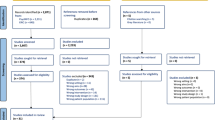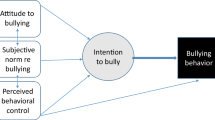Abstract
Describes the development and evaluation of a pilot 12-session, school-based preventive intervention designed to enhance resilience among inner-city children who have experienced major life stress. Thirty-six 4th–6th grade children participated in the intervention in groups of 5–8 co-led by school personnel. The curriculum focussed on understanding feelings in oneself and others, perspective-taking, social problem-solving, dealing with solvable and unsolvable problems, and building self-efficacy and esteem. Pre-post evaluation showed significant improvement among participants on teacher-rated indices of learning problems and task orientation and on child ratings of perceived self-efficacy, realistic control attributions and anxiety. Program limitations and factors that restrict generalization are considered and new directions for program development and research are proposed.
Similar content being viewed by others
References
Anthony, E. J. & Cohler, B. J., Eds. (1987).The invulnerable child. New York: Guilford Press.
Cicchetti, D. (1984). The emergence of developmental psychopathology.Child Development, 55, 1–7.
Cicchetti, D. (1989). Developmental psychopathology: Some thoughts on its evolution.Development and Psychopathology, 1, 1–4.
Cowen, E. L. (1984). A general structural model for primary prevention program development in mental health.Personnel and Guidance Journal, 62, 485–490.
Cowen, E. L. (1991). In pursuit of wellness.American Psychologist, 46, 404–408.
Cowen, E. L. (1994). The enhancement of psychological wellness: Challenges and opportunities.American Journal of Community Psychology, 22 (In press).
Cowen, E. L., & Work, W. C. (1988). Resilient children, psychological wellness and primary prevention.American Journal of Community Psychology, 16, 591–607.
Cowen, E. L., Work, W. C., Hightower, A. D., Wyman, P. A., Parker, G. R., & Lotyczewski, B. S. (1991). Toward the development of a measure of perceived self-efficacy in children.Journal of Clinical Child Psychology, 20, 169–178.
Cowen, E. L., Work, W. C., Wyman, P. A., Parker, G. R., Wannon, M. & Gribble, P. A. (1992). Test comparisons among stress-affected, stress resilient and nonclassified 4th–6th grade urban children.Journal of Community Psychology, 20, 200–214.
Cowen, E. L., Wyman, P. A., Work, W. C., & Parker, G. R. (1990). The Rochester Child Resilience Project (RCRP): Overview and summary of first year findings.Development and Psychopathology, 2, 193–212.
Garmezy, N. (1982). Foreword. In E. E. Werner & R. S. Smith,Vulnerable but invincible: A study of resilient children (pp. xii-xix). Nw York: McGraw-Hill.
Garmezy, N., Masten, A. S., & Tellegen, A. (1984). Studies of stress-resistant children: A building block for developmental psychopathology.Child Development, 55, 97–111.
Garmezy, N., & Nuechterlein, K. (1972). Invulnerable children: The fact and fiction of competence and disadvantage.American Journal of Orthopsychiatry, 42, 328–329.
Garmezy, N., & Tellegen, A. (1984). Studies of stress-resistant children: Methods, variables and preliminary findings. In F. Morrison, C. Ford, & D. Keating (Eds.),Advances in Applied Developmental Psychology, Vol. 1, (pp. 1–52). New York: Academic Press.
Gribble, P. A., Cowen, E. L., Wyman, P. A., Work, W. C., Wannon, M., & Raoof, A. (1993). Parent and child views of the parent child relationship and resilient outcomes among urban children.Journal of Child Psychology and Psychiatry, 34, 507–519.
Hightower, A. D., Work, W. C., Cowen, E. L., Lotyczewski, B. S., Spinell, A. P., Guare, J. C., & Rohrbeck, C. A. (1986). The Teacher-Child Rating Scale: A brief objective measure of elementary children's school problem behaviors and competencies.School Psychology Review, 15, 393–409.
Iker, M. R. (1990). Evaluation of a school-based preventive intervention for at-risk urban children. Unpublished Ph.D. dissertation, University of Connecticut, Storrs, CT.
Masten, A. S. (1989). Resilience in development: Implications of the study of successful adaptation for developmental psychopathology. In D. Cicchetti (Ed.),Rochester Symposium on Developmental Psychopathology, Vol. 1, (pp. 261–294). Hillsdale, NJ: Erlbaum.
Masten, A. S., Best, K. M., & Garmezy, N. (1990). Resilience and development: Contributions from the study of children who overcome adversity.Development and Psychopathology, 2, 425–444.
Parker, G. R., Cowen, E. L., Work, W. C., & Wyman, P. A. (1990). Test correlates of stress affected and stress resilient outcomes among urban children.Journal of Primary Prevention, 11, 19–35.
Rutter, M. (1987). Psychosocial resilience and protective mechanisms.American Journal of Orthopsychiatry, 57, 316–331.
Spielberger, C. D. (1973).State-Trait Anxiety Inventory for Children: Preliminary manual. Palo Alto, CA: Consulting Psychologists Press.
Wannon, M. (1990)Children's control beliefs about controllable and uncontrollable events: Their relationship to stress resilience and psychosocial adjustment. Unpublished Ph.D. dissertation, University of Rochester.
Weissberg, R. P. & Elias, M. J. (1993). Enhancing young people's social competence and health behavior: An important challenge for educators, scientists, policy makers and funders.Applied and Preventive Psychology, 2, 179–190.
Werner, E. E. (1993). Risk, resilience and recovery: Perspectives from the Kauai longitudinal study.Development and Psychopathology, 5, 503–515.
Werner, E. E., & Smith, R. S. (1982).Vulnerable but invincible: A study of resilient children. New York: McGraw-Hill.
Werner, E. E. & Smith, R. S. (1992).Overcoming the odds: High risk children from birth to adulthood. Ithaca, NY: Cornell University Press.
Work, W. C., Cowen, E. L., Parker, G. W., & Wyman, P. A. (1990). Test correlates of stress affected and stress resilient outcomes among urban children.Journal of Primary Prevention, 11, 19–35.
Wyman, P. A., Cowen, E. L., Work, W. C., & Parker, G. R. (1991). Developmental and family milieu interview correlates of resilience in urban children who have experienced major life-stress.American Journal of Community Psychology, 19, 405–4266.
Wyman, P. A., Cowen, E. L., Work, W. C., Raoof, A., Gribble, P. A., Parker, G. R., & Wannon, M. (1992). Interviews with children who experienced major life stress: Family and child attributes that predict resilient outcomes.Journal of the American Academy of Child and Adolescent Psychiatry, 31, 904–910.
Yoshikawa, H. (1994). Prevention as cumulative protection: Effects of early family support and education on chronic delinquency and its risks.Psychological Bulletin, 115, 28–54.
Zigler, E., Taussig, C., & Black, K. (1992). A promising preventative for juvenile delinquency.American Psychologist, 47, 997–1006.
Author information
Authors and Affiliations
Rights and permissions
About this article
Cite this article
Cowen, E.L., Wyman, P.A., Work, W.C. et al. A preventive intervention for enhancing resilience among highly stressed urban children. J Primary Prevent 15, 247–260 (1995). https://doi.org/10.1007/BF02197474
Issue Date:
DOI: https://doi.org/10.1007/BF02197474




